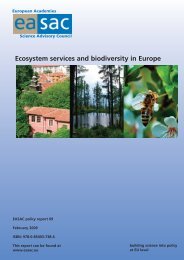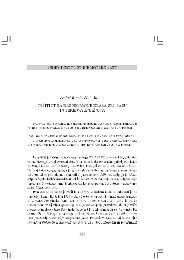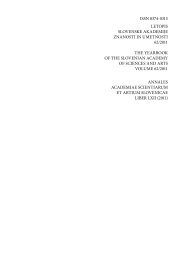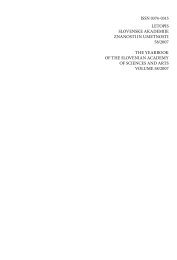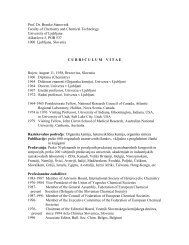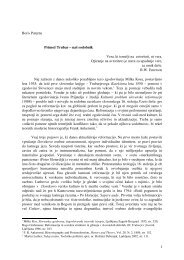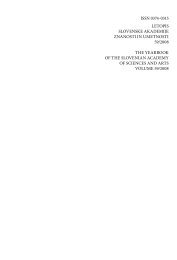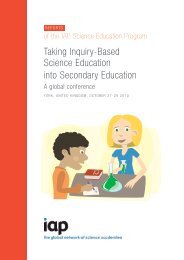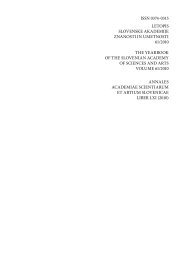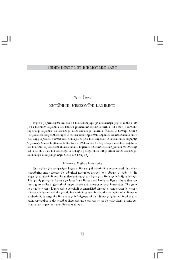- Page 1 and 2: ISSN 0374-0315 LETOPIS SLOVENSKE AK
- Page 3 and 4: SLOVENSKE AKADEMIJE ZNANOSTI IN UME
- Page 5 and 6: VSEBINA / CONTENTS I. ORGANIZACIJA
- Page 7 and 8: Karl Stuhlpfarrer .................
- Page 9 and 10: I ORGANIZACIJA SAZU SASA ORGANIZATI
- Page 11 and 12: SKUPŠČINA SAZU IZVRŠILNI ODBOR P
- Page 13 and 14: ORGANIZACIJA SAZU V LETU 2009 A) PR
- Page 15 and 16: Člani akademiki: Robert Blinc , Bo
- Page 17 and 18: KRONOLOŠKI PRIKAZ VODSTVA AKADEMIJ
- Page 19 and 20: II POROČILO O DELU SAZU REPORT ON
- Page 21 and 22: SLOVENSKA AKADEMIJA ZNANOSTI IN UME
- Page 23 and 24: dostojanstva človeškega bitja v z
- Page 25: SLOVENIAN ACADEMY OF SCIENCES AND A
- Page 29 and 30: DELO SKUPŠČINE SAZU Skupščina S
- Page 31 and 32: Akademija je kot v prejšnjih obdob
- Page 33 and 34: Po rebalansu proračuna se prihodki
- Page 35 and 36: N/82.300 Organiziranje razstav, sej
- Page 37 and 38: SKLEP: V verifikacijsko komisijo st
- Page 39 and 40: Hans Rothe (II. razred) 57 James W.
- Page 41 and 42: je več vabljenih predavanj in razg
- Page 43 and 44: septembra je bila predstavljena mon
- Page 45 and 46: B. Stanovnik je predstojnik Oddelka
- Page 47 and 48: stnosti in biogeografskih različno
- Page 49 and 50: nju vračali v razpravah na več se
- Page 51 and 52: Za sodelovanje pri uredniškem delu
- Page 53 and 54: Svet za energetiko Svet za energeti
- Page 55 and 56: Predlog za razglasitev Vrbe za spom
- Page 57 and 58: Odbor za slovenski jezik Komisija z
- Page 59 and 60: kot nesprejemljivo. Člani komisije
- Page 61 and 62: Hrvaška akademija znanosti in umet
- Page 63 and 64: na sestanku zastopal predstojnik od
- Page 65 and 66: MEDNARODNA IZMENJAVA RAZISKOVALCEV
- Page 67 and 68: Poljska akademija znanosti Dr. Andr
- Page 69 and 70: Poljska akademija znanosti Dr. Andr
- Page 71 and 72: Tine Hribar je ob 90. jubileju Filo
- Page 73 and 74: ZNANSTVENA SREČANJA / SCIENTIFIC M
- Page 75 and 76: Program: 10. september Plenary Sess
- Page 77 and 78:
Saša Divjak, Univerza v Ljubljani,
- Page 79 and 80:
9. novembra Predstavitev Vitruvijev
- Page 81 and 82:
27. 5. Prof. dr. Nenad Cambi BRONAS
- Page 83 and 84:
terialni ravni so nam vsem stvari n
- Page 85 and 86:
membni soustvarjalec. Tu jezik tudi
- Page 87 and 88:
Publicirati je začel leta 1952 in
- Page 89 and 90:
ali pa ena sama tvorita tudi z drug
- Page 91 and 92:
polnil preučevanje historične fon
- Page 93 and 94:
si. Neverjetno je, kaj vse so ljudj
- Page 95 and 96:
IIΙ ČLANI MEMBERS letopis-2009-3.
- Page 97 and 98:
REDNI, IZREDNI IN DOPISNI ČLANI I.
- Page 99 and 100:
Zasebni naslov: 5211 Kojsko, Gornje
- Page 101 and 102:
Pusić, Eugen , rojen 1. julija 191
- Page 103 and 104:
Orešnik, Janez , dr. znanosti, red
- Page 105 and 106:
Woschitz , Karl Matej, rojen 19. se
- Page 107 and 108:
Kernel, Gabrijel , dr. fizikalnih z
- Page 109 and 110:
Pirc, Raša , dr. fizikalnih znanos
- Page 111 and 112:
IV. RAZRED za naravoslovne vede Red
- Page 113 and 114:
Rojen 13. januarja 1930 v Ljubljani
- Page 115 and 116:
Bernik, Janez , akademski slikar, r
- Page 117 and 118:
Zasebni naslov: 1434 Loka pri Zidan
- Page 119 and 120:
Zasebni naslov: 1000 Ljubljana, Jak
- Page 121 and 122:
Službeni naslov: Klinični center,
- Page 123 and 124:
Korva M., Duh D., Puterle A., Trila
- Page 125 and 126:
ferroelectric and relaxor ferromagn
- Page 127 and 128:
3-5 maggio 2007], (Antichità Altoa
- Page 129 and 130:
Zupančič B., Nikonov A. V., Florj
- Page 131 and 132:
DRUGO Fajfar P. (ur. 2003-) Earthqu
- Page 133 and 134:
Gogala M.: Razvoj zoofiziologije na
- Page 135 and 136:
ČLANKI IN ESEJI Grafenauer N.: Sim
- Page 137 and 138:
dinović Zalaznik. - Ljubljana : Fe
- Page 139 and 140:
Kos B.: Simfonija št. 2 (Simfonija
- Page 141 and 142:
Shuilian v zgornjem porečju reke C
- Page 143 and 144:
Ikeda S., Kreft I., Yamahata Y., Ik
- Page 145 and 146:
Lebič L.: Barvni krog za sedem izv
- Page 147 and 148:
skem. Celjska Mohorjeva družba: Dr
- Page 149 and 150:
Minatti I.: Radio Slovenija, Progra
- Page 151 and 152:
PROJEKTI Mušič M.: Slomškov trg
- Page 153 and 154:
tember, oktober in november 2009, (
- Page 155 and 156:
Prihaja drugi val parkomatov, Dnevn
- Page 157 and 158:
Pahor B.: Villa am See. Prev. Čern
- Page 159 and 160:
Pavček T.: Same pesmi o ljubezni.
- Page 161 and 162:
Pavčnik M.: Materia constitutionis
- Page 163 and 164:
Peterlin M.: University of Erlangen
- Page 165 and 166:
Pirjevec J.: Načrtne »etnične č
- Page 167 and 168:
Bohanec Grabar P., Grabnar I., Rozm
- Page 169 and 170:
26-28, 2009 Warsaw - Poland, (Annal
- Page 171 and 172:
Splichal S.: University in the peri
- Page 173 and 174:
Stanovnik B., Uršič U., Svete J.:
- Page 175 and 176:
Komac M., Leban I., Stanovnik B.,
- Page 177 and 178:
Šalamun T.: Le Tour du monde en 80
- Page 179 and 180:
Šalamun T.: Death, Death, Death; P
- Page 181 and 182:
Šelih A.: Crime and globalisation.
- Page 183 and 184:
Biba Teržan OBJAVLJENA DELA Terža
- Page 185 and 186:
Tomaževič M.: Earthquake resistan
- Page 187 and 188:
Vito Turk OBJAVLJENA DELA Klarić M
- Page 189 and 190:
Suban D., Zajc T., Stoka V., Turk V
- Page 191 and 192:
narodnem simpoziju Iniziativa isont
- Page 193 and 194:
Zorko Z.: Porabski Slovenci danes :
- Page 195 and 196:
Žižek S.: In 1968, structures wal
- Page 197 and 198:
Znanstveni delavci in svetovalci SA
- Page 199 and 200:
in naravi pravoznanstva [Die (Un)pr
- Page 201 and 202:
italijanskim risorgimentom in južn
- Page 203 and 204:
SLAVKO SPLICHAL Skupščina SAZU je
- Page 205 and 206:
Dejavnost prof. dr. Slavka Splichal
- Page 207 and 208:
II. RAZRED za filološke in literar
- Page 209 and 210:
novatorsko je tudi njeno obširno r
- Page 211 and 212:
18. stoletju, kjer je začel, poseg
- Page 213 and 214:
paretičnih bolnikov ob uporabi zun
- Page 215 and 216:
drugih dvovalentnih ionov. R25 se o
- Page 217 and 218:
MIHA TOMAŽEVIČ Prof. Miha Tomaže
- Page 219 and 220:
Bibliografija Mihe Tomaževiča obs
- Page 221 and 222:
ne akademije znanosti (ZDA, 1970),
- Page 223 and 224:
industrija kmalu začela uvajati la
- Page 225 and 226:
Prof. dr. P. Haydon je bil večkrat
- Page 227 and 228:
pozicije. Hkrati ko je poučeval na
- Page 229 and 230:
šču Natzweiler-Struthof. Z verizm
- Page 231 and 232:
ALOJZ REBULA Alojz Rebula (roj. 21.
- Page 233 and 234:
Rebula sodi med največje mojstre j
- Page 235 and 236:
FRANC STRLE Franc Strle se je rodil
- Page 237 and 238:
kar ima za posledico ugotovitev le
- Page 239 and 240:
let prejšnjega stoletja, ko je pri
- Page 241 and 242:
UMRLI ČLANI letopis-2009-3.indd 24
- Page 243 and 244:
od 7. februarja 1968, redni član o
- Page 245 and 246:
Čelešnik, Franc , rojen 27. oktob
- Page 247 and 248:
Gligorić, Velibor , rojen 28. juli
- Page 249 and 250:
Kalin, Boris , rojen 24. junija 190
- Page 251 and 252:
Krašovec, Stane , rojen 14. julija
- Page 253 and 254:
Logar, Janez , rojen 3. februarja 1
- Page 255 and 256:
Molè, Vojeslav , rojen 14. decembr
- Page 257 and 258:
Pogačnik, Jože , rojen 14. marca
- Page 259 and 260:
Sever, Savin , rojen 27. junija 192
- Page 261 and 262:
Tesnière , Lucien, rojen 13. maja
- Page 263 and 264:
za sociologijo, politične vede in
- Page 265 and 266:
z drugimi domačimi in tujimi inšt
- Page 267 and 268:
Vasilij Melik se je rodil 17. janua
- Page 269 and 270:
v ustavni dobi habsburške monarhij
- Page 271 and 272:
Med drugim se je ukvarjala tudi z n
- Page 273 and 274:
akademije (Academia Europaea) v Lon
- Page 275 and 276:
na Univerzi v Poznanju, kjer je del
- Page 277 and 278:
je navezal tudi stike s slovenskimi
- Page 279 and 280:
Slovenijo, je Slovenska akademija z
- Page 281 and 282:
IV BIBLIOTEKA ΙΝ PUBLIKACIJE SAZU
- Page 283 and 284:
V letu 2009 smo se poslovili od dol
- Page 285 and 286:
tronsko obliko in v COBIB.SI, s či
- Page 287 and 288:
Za razstavo »Robbov vodnjak - zgod
- Page 289 and 290:
OSEBJE Od Biblioteke se je v tem le
- Page 291 and 292:
PUBLIKACIJE II. RAZREDA ZA FILOLOŠ
- Page 293 and 294:
SOZALOŽNIŠTVO 17. Pitamic, Leonid
- Page 295 and 296:
28. Ahmatova, Anna: Pesmi. Miniatur
- Page 297 and 298:
V SUMMARY letopis-2009-3.indd 297 4
- Page 299 and 300:
SASA ORGANIZATION A) THE PRESIDENCY
- Page 301 and 302:
MEMBERS OF THE SLOVENIAN ACADEMY OF
- Page 303 and 304:
12, 2003. Vice-President of the Slo
- Page 305 and 306:
Home: D-5330 Königswinter 41, Am L
- Page 307 and 308:
Home: SI-1000 Ljubljana, Rusjanov t
- Page 309 and 310:
Corresponding Members Cooper, Henry
- Page 311 and 312:
Office: AT-8010 Graz, Karl-Franzens
- Page 313 and 314:
Office: Faculty of Mathematics and
- Page 315 and 316:
Turk, Vito , D. Chem. Sc., born on
- Page 317 and 318:
Home: HR-10000 Zagreb, Savska cesta
- Page 319 and 320:
Kreft, Ivan , D. Sc., born on Novem
- Page 321 and 322:
Haydon, Philip G. , born on April 1
- Page 323 and 324:
etired. Corresponding Member since
- Page 325 and 326:
Home: SI-1230 Domžale, Slamnikarsk
- Page 327 and 328:
Hrvatski trg 6, Phone: +386 1/ 300-
- Page 329 and 330:
Office: Baylor College of Medicine,
- Page 331 and 332:
series and the anniversary monograp
- Page 333 and 334:
D Deanović, Mirko 245 Demus, Otto
- Page 335 and 336:
Kos, Janko 11, 102, 139, 225, 307 K
- Page 337 and 338:
Peklenik, Janez 11, 14, 54, 62, 107
- Page 339 and 340:
Vavilov, Sergej Ivanovič 261 Vavpe



